13-01
The Mountain at Sinai [13-01]
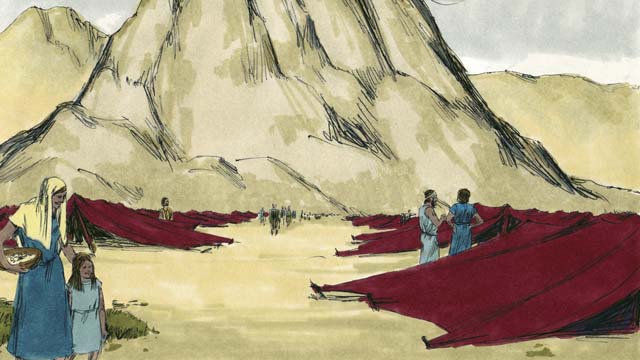
After God led the Israelites through the Red Sea, he led them through the wilderness to a mountain called Sinai. This was the same mountain where Moses had seen the burning bush. The people set up their tents at the base of the mountain.
带领以色列人穿过红海后,神又带领他们穿过旷野,来到了一座名叫西奈的山下,于是人们在山下安营扎寨。
Important Terms:
Translation Notes:
- burning bush - Before Moses returned to Egypt, God had spoken to him from a shrub that was on fire, but that was not burned up by the fire. See [[:zh:obs:notes:frames:09-12|[09-12]]].
- set up their tents - The Israelites had to travel a great distance from Egypt to the Promised Land. So they took tents with them so that they could set them up as shelters and sleep in them along the way. Some languages could translate this as, "hung their tents."
- base of the mountain – This could be translated as, "bottom of the mountain." This refers to the area of land that is located next to the place where the ground starts to slant upward to form a mountain.
13-02
God Called Israel [13-02]
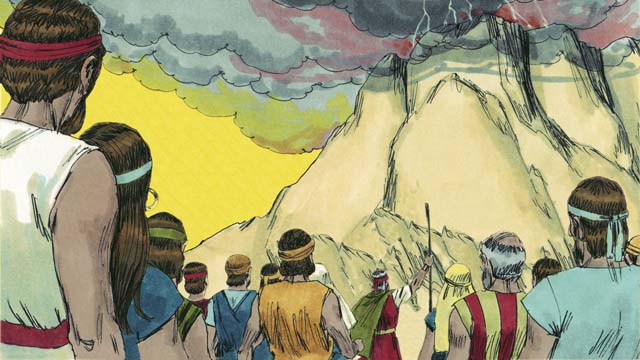
God said to Moses and the people of Israel, “If you will obey me and keep my covenant, you will be my prized possession, a kingdom of priests, and a holy nation.”
神对摩西以及以色列的民说,“你们若听我的话,守我的约,就是我贵重的产业,祭祀的王国,神圣的国度。
Important Terms:
Translation Notes:
- keep my covenant - This could be translated as, "do what my covenant requires you to do." Obeying and keeping the covenant are not two different things. One way to make this clear would be to say, "obey me by keeping my covenant." God will soon tell them what his covenant requires.
- my prized possession - This could be translated as, "You will be my possession that I value most" or, "You will be the people that I treasure more than any other group of people" or, "You will be my own precious people."
- You will be…a kingdom of priests - This could be translated as, "I will be your king and you will be like priests." The Israelites were supposed to teach the other nations about God and be a mediator between God and the nations just as there were priests in the nation of Israel to go between God and the Israelites.
13-03
Moses Met God [13-03]
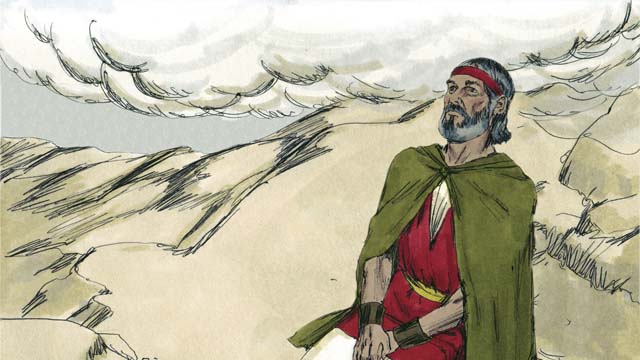
Three days later, after the people had prepared themselves spiritually, God came down on top of Mount Sinai with thunder, lightning, smoke, and a loud trumpet blast. Only Moses was allowed to go up the mountain.
三天后,人们做好了准备。伴随着电闪雷鸣,和吹号角声,神降临到西奈山顶。只有摩西被准许到山上去。
Important Terms:
Translation Notes:
- Three days later - In other words, three days after they arrived at Mount Sinai and God first spoke to them.
- prepared themselves spiritually - This refers to ceremonial cleansing in preparation to meet with God. This could be translated as, "got ready to meet with God" or, "prepared themselves to meet with God."
- loud trumpet blast - This could be translated as, "and a loud sound came from a horn" or, "and a horn was blown and it made a loud sound" or, "and they heard the loud sound of a horn blowing." Trumpets were made out of ram's horns. They were used that day to call the people to gather at the mountain and meet with God.
- Only Moses was allowed to go up - This could be translated as, "God permitted Moses to go up, but he did not permit anyone else to go up."
13-04
I Am Your God [13-04]
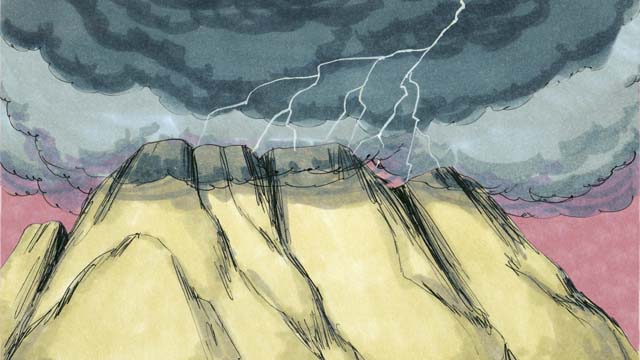
Then God gave them the covenant and said, “I am Yahweh, your God, who saved you from slavery in Egypt. Do not worship other gods.”
神与他们立了约说,“我是你的神你的主,将你从埃及地救出来的。不要侍奉别的神。”
Important Terms:
Translation Notes:
- Then God gave them the covenant and said - What God says next is the content of the covenant, that is, he tells the people the things that they must obey. This could be translated as, "Then God told them His covenant. He said" or, "Then God made this covenant with them:"
- Yahweh your God - In some languages it might be more natural to change the order and say "your God Yahweh." Make sure it does not sound like the Israelites had more than one God. It should be clear that Yahweh is the only God. Another way to translate this would be, "Yahweh, who is your God" or, "your God, whose name is Yahweh."
- who saved you from slavery - This could be translated as, "I freed you from slavery."
13-05
The Commandments [13-05]
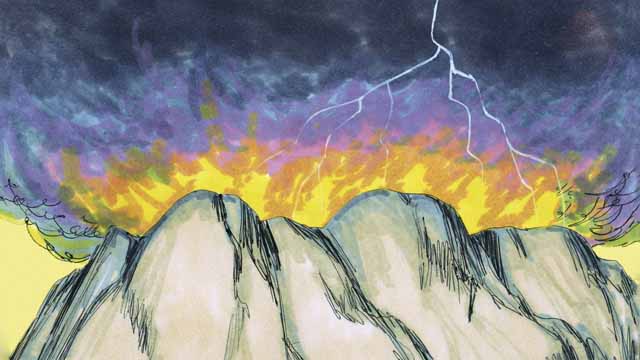
“Do not make idols and do not worship them, because I, Yahweh, am a jealous God. Do not use my name in a disrespectful way. Be sure to keep the Sabbath day holy. That is, do all your work in six days, for the seventh day is a day for you to rest and to remember me.”
“不要制作偶像,也不要敬拜他们。因为我,你的神你的主,是妒忌的神。不要亵渎你神的名。记住要守安息圣日。在六日内做完所有的工,第七日要用来休息,以纪念你的神。”
Important Terms:
Translation Notes:
- (God continues speaking to Moses.)
- I, Yahweh, am a jealous God - This could be translated as, "I, Yahweh, will be angry if you worship or honor anything besides me." God strongly desires that his people love, serve, and obey Him more than anything or anyone else. He must be the only master of their lives.
- Do not use my name in a disrespectful way - This could be translated as, "Do not talk about me in a way that does not show respect and honor" or, "Talk about me in a way that gives me proper respect and honor."
- seventh day - To translate this, it is best to use the number ("seventh") rather than give the name of a specific day of the week.
- to remember me - This could be translated as, "to keep me in mind" or, "to honor me."
13-06
More Commandments [13-06]
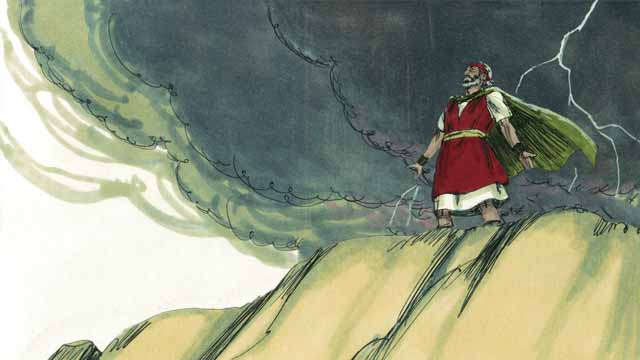
“Honor your father and your mother. Do not murder. Do not commit adultery. Do not steal. Do not lie. Do not desire to have your neighbor’s wife, his house, or anything that belongs to him.”
“尊敬你的父母。不可杀人。不可奸淫。不可偷盗。不可说谎。不可贪图邻居的妻子,房子,或任何属于他的东西。”
Important Terms:
Translation Notes:
- (God continues speaking to Moses.)
- Do not commit adultery - This could be translated as, "Do not have sexual relations with someone else's spouse" or, "Do not have marital relations with another man's wife or another woman's husband." Be sure to translate this in a way that doesn't offend or embarrass people. Languages often have an indirect, polite way of saying this, such as, "Do not sleep with."
- Do not lie - This means, "Do not say false things about other people."
13-07
The Stone Tablets [13-07]
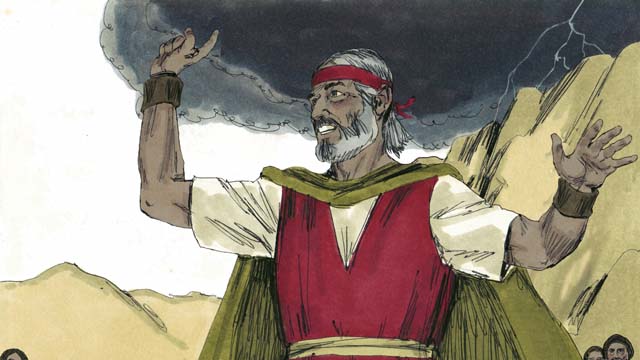
Then God wrote these Ten Commandments on two stone tablets and gave them to Moses. God also gave many other laws and rules to follow. If the people obeyed these laws, God promised that he would bless and protect them. If they disobeyed them, God would punish them.
神在石板上写下了这十诫,给了摩西。神也给了很多其它需遵行的律法。只要人们遵行这些律法,神应许会祝福并保护他们。但如果人们不遵行这些律法,神就要惩罚他们。
Important Terms:
Translation Notes:
- these Ten Commandments - This refers to the commands God gave to Moses for the Israelites to obey. They are listed in frames [[:zh:obs:notes:frames:13-05|[13-05]]] and [[:zh:obs:notes:frames:13-06|[13-06]]].
- stone tablets - These were flat pieces of stone.
- God also gave - This can be translated as, "God also told them."
- to follow - This can be translated as, "that they must obey" or, "that they must keep."
13-08
The Tent of Meeting [13-08]
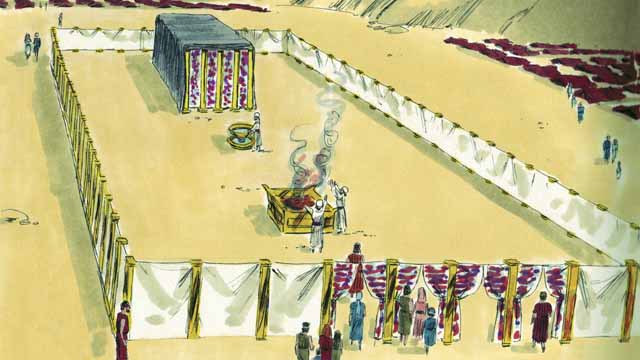
God also gave the Israelites a detailed description of a tent he wanted them to make. It was called the Tent of Meeting, and it had two rooms, separated by a large curtain. Only the high priest was allowed to go into the room behind the curtain, because God lived there.
为了让以色列人造出合他心意的帐幕,神给了他们一套详细的指示。那帐幕被称为会幕。会幕有两个房间,用一个很大的帘子隔开。除了大祭司,没有人可以进入到帘子后面的房间,因为神住在那里。
Important Terms:
Translation Notes:
- a detailed description - This could be translated as, "God described it in detail" or, "God told them exactly how He wanted them to make it."
- It was called - This could be translated as, "They called it" or, "Moses called it."
- the room behind the curtain - This room was hidden by the curtain. Some languages would call this room, "the room in front of the curtain."
- God lived there - If this phrase would lead people to think that God was limited to living in the tent, here are some ways of translating it: "God was there" or, "God revealed Himself to humans there."
13-09
The Altar [13-09]
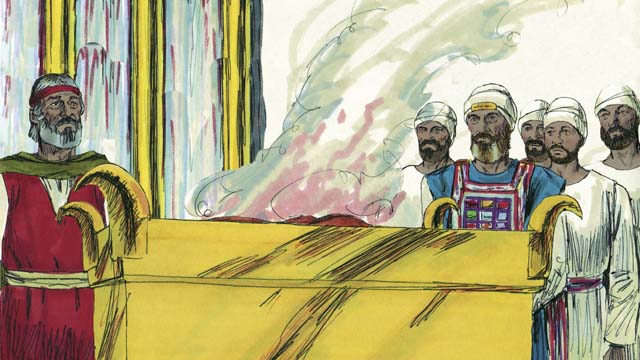
Anyone who disobeyed God's law could bring an animal to the altar in front of the Tent of Meeting as a sacrifice to God. A priest would kill the animal and burn it on the altar. The blood of the animal that was sacrificed covered the person’s sin and made that person clean in God's sight. God chose Moses' brother, Aaron, and Aaron's descendants to be his priests.
如果有人违反了神的律例,他可以带一只动物到会幕里作为祭物献给神。祭司会在祭坛上杀掉并焚烧这个动物。祭物的血将掩盖那个人的罪,使他在神的眼里得以清洁。神选了亚伦,也就是摩西的哥哥,和他的后代作为祭司。
Important Terms:
Translation Notes:
- God's law - This refers to all the commandments and instructions that God had told the Israelites to obey.
- to the Tent of Meeting - They did not bring the animal inside the Tent of Meeting, but to the altar in front of the Tent of Meeting. Be sure not to use an expression that means that they brought it inside.
- covered the person's sin - When people brought animals to sacrifice, God chose to see the blood of the animals as a covering over their sin. This is like hiding something that is ugly or dirty by covering it.
- clean in God's sight - This could be translated as, "as if he did not have the sin according to God" or, "free of the punishment for breaking God's law."
13-10
The People Sinned [13-10]
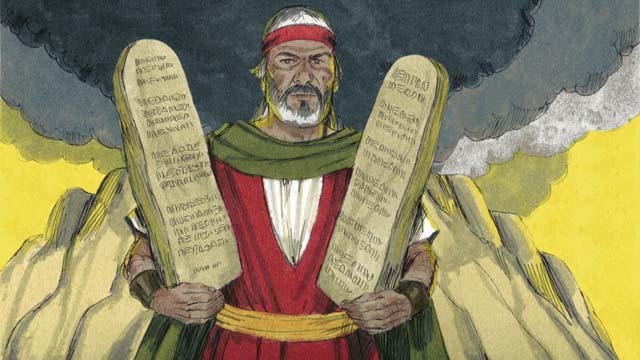
The people all agreed to obey the laws that God had given them, to worship only God, and to be his special people. But a short time after they promised to obey God, they sinned terribly.
百姓都说愿意遵守神给他们的律例,只敬拜神,成为神的选民。但仅仅在承诺顺服神之后不久,他们就犯了很大的罪。
Important Terms:
Translation Notes:
- given them - This could be translated as, "told them to obey."
- his special people - From among all the nations, God had chosen the Israelites for his special purpose. This could be translated as "his special nation" or, "his own people" or, "the nation he chose to be his people."
- a short time – The people sinned during the forty days that Moses was on the mountain with God.
- sinned terribly - They sinned in a way that was especially offensive to God. This could be translated as, "they sinned badly," or "they did something that was very bad" or, "they did something bad that made God very angry."
13-11
Make Us an Idol for Us [13-11]
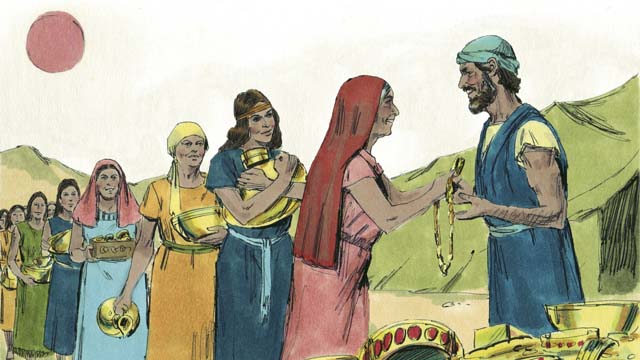
For many days, Moses was on top of Mount Sinai talking with God. The people became tired of waiting for him to return. So they brought gold to Aaron and asked him to make an idol for them!
摩西在西奈山上很多天,和神说话。人们厌倦了等待他归来。所以他们把金子带到亚伦面前,让他为他们造一个偶像!
Important Terms:
Translation Notes:
- The people became tired of waiting - This could be translated as, "The people became impatient because he did not return quickly" or, "The people didn't want to wait any longer for him to return."
- brought gold - These were objects and jewelry made of gold, which could be melted and formed into other things.
13-12
The Golden Calf [13-12]
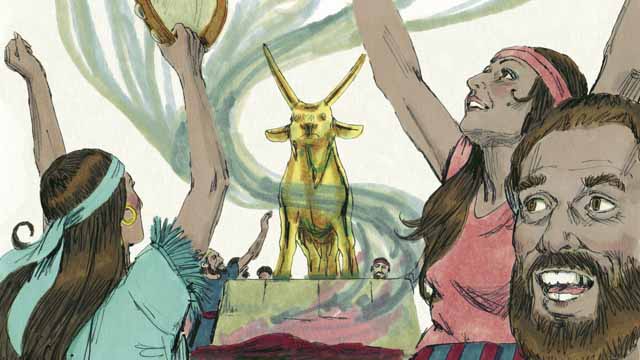
Aaron made a golden idol in the shape of a calf. The people began to wildly worship the idol and make sacrifices to it! God was very angry with them because of their sin and planned to destroy them. But Moses prayed for them, and God listened to his prayer and did not destroy them.
亚伦造了一个牛形的偶像。人们开始大肆的向偶像敬拜和献祭。神对他们犯的罪非常愤怒,想要除灭他们。摩西却为他们祷告,神聆听了他的祷告,没有除灭他们。
Important Terms: ###=
Translation Notes:
- made a golden idol - Aaron took the things made of gold that the people had brought to him, melted them, combined them, and formed them into the shape of a calf.
- wildly worship - The people were sinning by worshiping the idol and also by doing sinful things as they worshiped it.
- listened to his prayer - God always hears prayer. In this situation, "listened" means that God agreed to do what Moses asked.
13-13
Moses Was Angry [13-13]
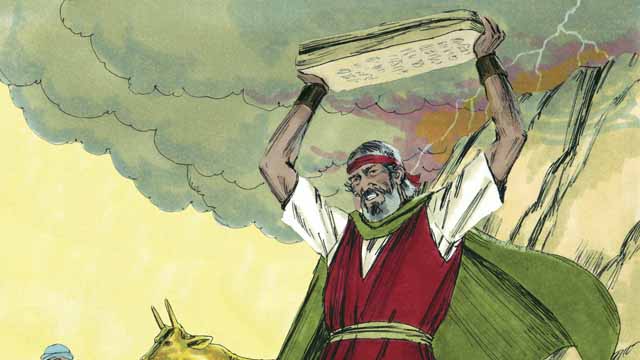
When Moses came down the mountain and saw the idol, he was so angry that he smashed the stones on which God had written the Ten Commandments.
摩西下山后看到那尊偶像,非常愤怒,摔碎了那写了十诫的石板。
Important Terms:
Translation Notes:
- smashed the stones - He threw the stones down on the ground and they broke up into little pieces.
13-14
Moses Destroyed the Idol [13-14]
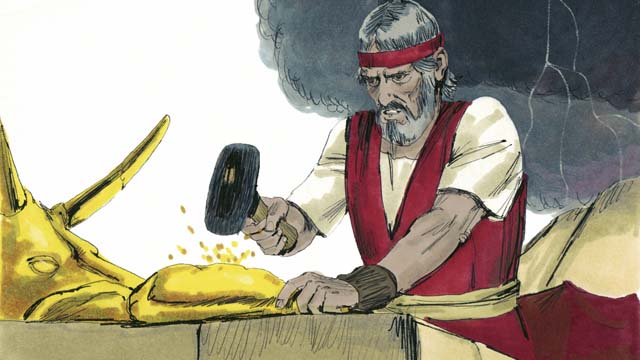
Then Moses beat the idol into powder, threw the powder into some water and made the people drink the water. God sent a plague on the people and many of them died.
他将偶像摔成粉末,然后将粉末放在水里,让人们喝。神降灾到人群中,很多人死去。
Important Terms:
Translation Notes:
- beat the idol into powder - Moses utterly destroyed the idol by pounding it into fine particles.
- into some water - Moses scattered the gold powder over a large expanse of water.
- a plague - This could be translated as, "a terrible disease."
13-15
Moses Prayed for Israel [13-15]
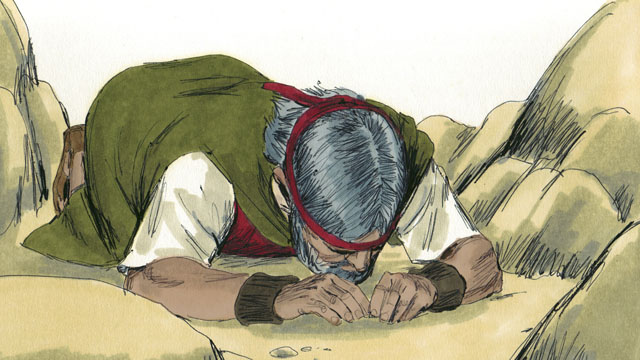
Moses climbed the mountain again and prayed that God would forgive the people. God listened to Moses and forgave them. Moses wrote the Ten Commandments on new stone tablets to replace the ones he had broken. Then God led the Israelites away from Mount Sinai toward the Promised Land.
摩西再次上山,向神祷告,求神原谅他的民。神听了摩西的祷告,原谅了他们。摩西在新的石板上写上十诫,以替换之前损毁的石板。接下来,神便带领以色列人离开西奈山,向应许之地前进。
Important Terms:
Translation Notes:
- listened to - See how you translated this phrase in [[:zh:obs:notes:frames:13-12|[13-12]]].
- Moses wrote - Moses chiseled the words into the stone using a tool.
- A Bible story from - These references may be slightly different in some Bible translations.
